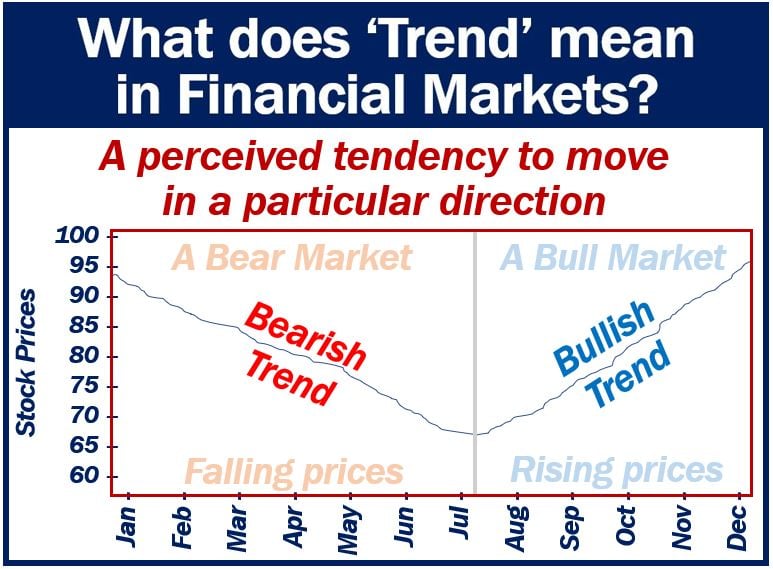A Trend is a general direction into which something is changing, developing, or veering toward. The term may also mean a fashion or craze, i.e., a fad. The verb ‘to trend’ means to develop or change in a general direction. In the world of social media, if something trends it is the topic of many posts.
In the world of business, a trend is a pattern of gradual change in a process, output, or condition. It is an average or general tendency. If I say: “There has been a trend towards shorter-term mortgages,” it means more people are now taking shorter-term mortgages. In other words, there has been a tendency towards shorter-term mortgages.
Etymology of ‘trend’
Etymology is the study of the origin of words and how their meanings evolved.
The Online Etymology Dictionary says the verb ‘trend‘ emerged in the English language in the 1590s. At the time, it meant “to run or bend in a certain direction (of costs, rivers, etc.).”
It came from the Middle English word ‘Trenden,’ which meant “to revolve, turn, roll about.” ‘Trenden’ came from the Old English word ‘Trendan,’ which meant “roll, revolve, turn around.”
The Old English word came from the Middle Low German ‘Trint‘ and Middle Low German word ‘Trent,’ which meant “boundary, ring.” Connections outside Germanic are uncertain.
The noun appeared in 1777 and meant “the way something bends.” It was not until the 1950s that the word also meant “a prevailing new tendency in popular fashion or culture.”

Market trends
A trend in financial markets is a perceived tendency to move in a specific direction over time. In other words, a perceived tendency to move in a particular direction.
We classify these trends as secondary for short time frames, primary for medium time frames, and secular for long time frames.
We can only confidently determine trends in hindsight. This is because, at any time, we do not know what future prices will be.
Bull market
A bull market or bullish trend is a market that has the tendency to move upward, i.e., prices are rising. If an investor feels bullish, he or she expects, for example, share prices to go up.
Bear market
A bear market or bearish trend is a market that has the tendency to move downward, i.e., prices are falling. If an investor feels bearish, he or she expects share prices to fall.
Market analysts spend considerable time creating models to predict these trends, which can significantly impact investment strategies and economic forecasts. These analytical models often incorporate complex algorithms that account for a multitude of variables, from geopolitical events to changes in consumer behavior, to enhance the accuracy of their predictions.
Trendy
A trendy person is somebody who is very up to date or fashionable. We can also use the term for styles or things. For example, a trendy hairstyle is a fashionable hairstyle. Trendy clothes are fashionable clothes.
